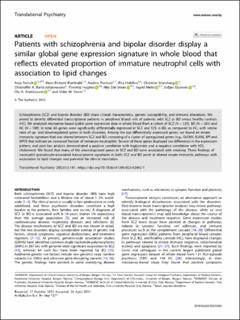Patients with schizophrenia and bipolar disorder display a similar global gene expression signature in whole blood that reflects elevated proportion of immature neutrophil cells with association to lipid changes
Torsvik, Anja; Brattbakk, Hans-Richard; Trentani, Andrea; Holdhus, Rita; Stansberg, Christine; Bartz-Johannessen, Christoffer; Hughes, Timothy; Steen, Nils Eiel; Melle, Ingrid; Djurovic, Srdjan; Andreassen, Ole; Steen, Vidar Martin
Journal article, Peer reviewed
Published version

Åpne
Permanent lenke
https://hdl.handle.net/11250/3097834Utgivelsesdato
2023Metadata
Vis full innførselSamlinger
- Department of Clinical Science [2317]
- Registrations from Cristin [9766]
Sammendrag
Schizophrenia (SCZ) and bipolar disorder (BD) share clinical characteristics, genetic susceptibility, and immune alterations. We aimed to identify differential transcriptional patterns in peripheral blood cells of patients with SCZ or BD versus healthy controls (HC). We analyzed microarray-based global gene expression data in whole blood from a cohort of SCZ (N = 329), BD (N = 203) and HC (N = 189). In total, 65 genes were significantly differentially expressed in SCZ and 125 in BD, as compared to HC, with similar ratio of up- and downregulated genes in both disorders. Among the top differentially expressed genes, we found an innate immunity signature that was shared between SCZ and BD, consisting of a cluster of upregulated genes (e.g., OLFM4, ELANE, BPI and MPO) that indicate an increased fraction of immature neutrophils. Several of these genes displayed sex differences in the expression pattern, and post-hoc analysis demonstrated a positive correlation with triglyceride and a negative correlation with HDL cholesterol. We found that many of the downregulated genes in SCZ and BD were associated with smoking. These findings of neutrophil granulocyte-associated transcriptome signatures in both SCZ and BD point at altered innate immunity pathways with association to lipid changes and potential for clinical translation.
